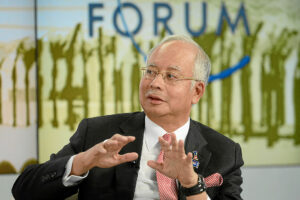Najib: a case of being first

I got a close look at Dato’ Sri Haji Mohammad Najib bin Tun Haji Abdul Razak, Malaysia’s 6th prime minister, in one of those official functions of Malaysia’s government led by then Prime Minister (PM) Dato’ Seri Dr. Mahathir bin Mohamad, its 4th and then 7th head of state. From 1992-94, we served as research head of the Southeast Asian Central Banks (Seacen) Research and Training Center based in Kuala Lumpur. We could only be impressed by what we thought was a very orderly succession of leaders in Malaysia.
From the first PM, Tunku Abdul Rahman, to the 4th PM, Mahathir, the succession was straightforward. The successors were their deputies who were appointed to various ministries for well-rounded exposure to state governance. Being under a parliamentary system, the legislators were responsible for the execution of the national vision.
At that time, the fast-rising Dato’ Seri Anwar bin Ibrahim, then finance minister and deputy PM, was widely considered Mahathir’s heir apparent.
But Mahathir and Anwar fell out on political succession, a shock to the otherwise sedate politics in this charming monarchial country of 13 states and three federal territories. Mahathir stripped Anwar of all his posts in 1998 and in the following year he was jailed for alleged sodomy and corruption. Emerging as the opposition leader, he was released five years later when his conviction was reversed by the High Court. Anwar was imprisoned again, and while detained rejoined Mahathir’s new coalition and helped in Mahathir’s 2018 victory. He received a royal pardon, his ticket to run again for Parliament.
What motivated Mahathir’s return to politics was his successors in Tun Abdullah bin Ahmad Badawi and Najib as Malaysia’s 5th and 6th leaders. Badawi was a loyal Mahathir follower but his leadership was tainted with alleged corruption, cronyism and poor performance in curbing it. Mass support of the ruling party was dwindling. In addition, he was openly biased towards Malaysia as an Islamic state. Chinese and Indian Malaysians believe that the country is a secular state that transcends religion.
In the case of Najib, he served as minister of defense twice, education minister during the Asian Financial Crisis, and finance minister during the Global Financial Crisis. As Badawi’s deputy, Najib succeeded him as the 6th PM from 2009-2018. His paternal provenance is unquestionable. The son of Abdul Razak, Malaysia’s 2nd PM, founding father of ruling coalition Barisian Nasional and pioneer of the Malaysian New Economic Policy, Najib had what it takes to succeed and continue his father’s legacy of integrity and leadership.
But Najib blew it.
In 2018, Malaysian police raided Najib and his wife Rosmah’s homes as part of the investigation of Malaysia’s sovereign wealth fund 1Malaysian Development Berhad’s (1MDB) financial scandal. They recovered 284 boxes containing luxury handbags and 72 bags overflowing with jewelry, cash, watches, and other valuables. Najib was subsequently convicted in July 2020 on seven counts converging on the transfer of public funds to his own private bank account. He was sentenced to serve 12 years and fined nearly $47 million. Najib appealed to delay serving his sentence.
But justice in Malaysia is fast and furious. A few days ago, after just two years, the High Court finally denied Najib’s appeal as he continued to deny any wrongdoing. It was obvious the Court did not give weight to, one, his defense that the fund transfer came from the Saudi royal family’s donation, and, two, he was misled by alleged fugitive financier Jho Low. The Court ruled that Najib’s appeal as “devoid of any merits,” claiming that the defense was internally inconsistent and failed to raise reasonable doubt.
The tell-tale signs have been undeniable.
Najib co-founded 1MDB in 2009 after assuming the PM post. Aside from those found in his homes, Najib was also reported to have acquired a Picasso painting, a jet, a superyacht, and hotels. The US lawsuit also claimed that 1MDB funds were used to finance a 2013 Hollywood film The Wolf of Wall Street.
Thus, as early as 2015, six years into his leadership of Malaysia, Najib was already reported in social media as a multibillionaire in ringgit. He became one of Forbes’ 50 richest in Malaysia.
Tracing bank transfers from various sources, including a private Swiss bank in Singapore and a finance corporation based in the British Virgin Islands, The Wall Street Journal and Sarawak Report documented them with actual bank account numbers. The trouble was that these fund transfers ended up allegedly in Najib’s own account at a private bank in Kuala Lumpur.
And yes, the ultimate source: 1MDB! Originally formed to “drive strategic initiatives for long-term economic development” of Malaysia, it is a public limited company engaged in energy, tourism, real estate, and agri-business. Beyond that, 1MDB was exposed to big-ticket, high-profile projects.
At the same time that those funds were allegedly funneled into Najib’s account, 1MDB had raised suspicion that it was also engaged in money laundering, fraud, and theft. No less than the US Justice department claimed that some $3.5 billion was stolen from the state-owned fund, later escalated to $4.5 billion.
What is intriguing is that 1MDB must have covered these fund transfers also from loans reaching $7.8 billion, later adjusted to $12 billion. This is one of the problems with a state-owned wealth fund. It is normally authorized to receive capital infusion from the government and to borrow to beef up its funds. It cuts both ways: it sucks money from the budget and bloats the state’s liabilities for private gains.
But even without a wealth fund, the same malfeasance could be committed. The government undertakes big infrastructure projects funded from the budget, and more often than not, these are supplemented by large borrowing. If bribery, kickbacks, or commissions are involved, the proceeds could ultimately accumulate in the bank accounts of the public official.
People in the know suspected that the 1MDB scandal could not have happened without the collusion of some international investment banks. As BBC reported three years ago, Goldman Sachs “helped raise $6.5 billion for the Malaysian development fund, advising on three bond offerings in 2012 and 2013.”
Malaysian prosecutors also alleged the embezzlement of some $2.7 billion for bribery and purchase of luxury goods. This was later confirmed when the Goldman lead banker pleaded guilty in US court of participating in bribery and money laundering. This was the basis for Malaysia’s attorney general to charge the investment bank with dishonest appropriation of the sovereign wealth fund.
This specific case is just one of Najib’s first five trials. There are other charges that he would have to face involving the disposition of 1MDB funds as well as allegations of audit tampering. Prosecution of these cases would take time because Najib has pleaded not guilty.
To answer the question in the minds of many, the prospects for a reversal of the conviction are almost impossible, Anwar commented in a recent CNBC interview. He must know because his own previous conviction never stood a chance. Anwar also suggested a possible clemency from the Malaysian king, the Yang di-Pertuan Agong. But this route must be ruled out because the “financial impact of the 1MDB scandal” is just too consequential.
With his conviction, Najib chalks up a couple of firsts in the political history of Malaysia. He is the first PM to have been convicted and jailed for a criminal offense namely, corruption, abuse of power and money laundering. Political connections in Malaysia may still work but in this prominent case, Anwar warned that Najib should be prepared. “Prison … is tough, particularly compared to Najib’s lifestyle of seven-star hotels.”
Najib, as a convicted offender, is also the first PM to be prohibited from running for public office again. He is definitely disqualified as a candidate for Malaysia’s next general election in September next year. No one could argue that his four decades as a member of Parliament should count for something. He should have added to the illustrious legacy of his father as a public servant, rather than tarnishing it.
Through all the drama, the Philippines is challenged by the Malaysian justice system by proving its independence from politics, that Malaysia adheres to the rule of law. Based on media reports, many Malaysians “really wanted Najib to go to jail.” One can therefore claim that the biggest winner is the Malaysian people.
Writing a footnote about Najib’s “firsts” experience will be tricky. It will depend on those whom he will be leaving behind as he serves time in Kajang prison. As someone said, in life we pursue not conclusions but beginnings.
Diwa C. Guinigundo is the former deputy governor for the Monetary and Economics Sector, the Bangko Sentral ng Pilipinas (BSP). He served the BSP for 41 years. In 2001-2003, he was alternate executive director at the International Monetary Fund in Washington, DC. He is the senior pastor of the Fullness of Christ International Ministries in Mandaluyong.




